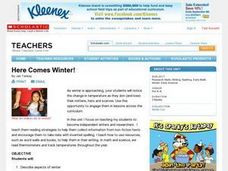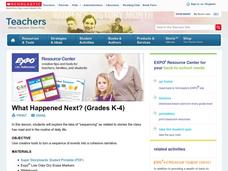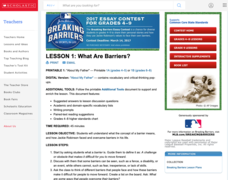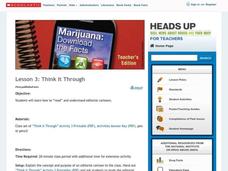Curated OER
Pilgrims: The First Americans
Fifth graders become familar with the pilgrims and first Thanksgiving through essays about important people of the time. In this Thanksgiving lesson plan, 5th graders choose an important figure from the time of the Pilgrims and...
Curated OER
History According to Shakespeare
Students read Shakespeare's, Julius Caesar while identifying a number of literary elements including simile, metaphor, personification, and hyperbole. As a response activity, they simulate a mock trial, and finally, compare and contrast...
Curated OER
Here Comes Winter!
Students investigate winter behaviors in animals. They describe winter and write about the characteristics of the season by drawing and labeling a winter picture. Students then conduct research on a chosen animal and create a chart. ...
Curated OER
A Wild Family Album!
Students create a scrapbook style family album for a selected animal. They complete an interactive Internet activity on research reports, fill out a graphic organizer, diagram a food web, and complete their scrapbook that includes...
Curated OER
Time to Rhyme
Students sing along to a hello song. They develop skills of phonemic awareness, literacy and social awareness. They think of words that rhyme with their names to add to the song.
Scholastic
Fly Guy Maze
Invite your kids to fly from the start to the end of this maze. Based around Hi! Fly Guy by Tedd Arnold, the goal of the maze is to help Fly Guy and Buzz Boy escape a pirate ship.
Scholastic
Fly Guy Word Find
Have your pupils buzz along and find all of the words in this grid! The words are related to Hi! Fly Guy by Tedd Arnold, so this would be a great resource to use alongside a reading of one of the Fly Guy books.
Scholastic
Test-Taking Strategies for Three Subject Areas
Sometimes a test page loaded with text can make a student's face go blank. Help them decipher what a text question is asking with a series of tips focused on reading comprehension, vocabulary, and language arts mechanics.
Scholastic
Perfect Postcards: California
It's time to hear about some adventures in travel! The Transcontinental Railroad changed life and travel in the United States during the 1800s. Practicing online research skills, pupils discover the features they would like to visit on...
Scholastic
Presenting Persuasively (Grades 9-12)
As a review of persuasive techniques, groups develop a one-sentence slogan designed to entice others to purchase a produce or adopt a point of view. The group then craft a storyboard for a commercial for their product.
Scholastic
What Happened Next? (Grades K-4)
Explore the structure of narrative writing with this fun, collaborative lesson. Start by reading aloud a short story, asking small groups of learners to fill in key events on a large story board prepared on the class whiteboard....
Scholastic
Study Jams! The Human Body
A brief set of anatomy slides introduces viewers to the five levels of organization (cells, tissues, organs, organ systems, and organisms). The slides focus on the muscular, circulatory, respiratory, and digestive systems.
Scholastic
Study Jams! The Kingdoms of Life
Zoe and RJ discuss the way scientists classify organisms into five kingdoms. Characteristics of each group are highlighted within their conversation and with text. First-time taxonomists can view the animation at home, take the...
Scholastic
Study Jams! Igneous Rocks
Dynamic music pumps up viewers as they learn about intrusive and extrusive igneous rocks. Presentation slides include a graphic depiction of magma below Earth's surface , photographs of lava exploding and flowing, and close-ups of...
Scholastic
Study Jams! Distributive Property
The distributive property is a foundational skill taught two ways in this interactive web page. Your young mathematicians can practice their order of operations by solving distributive problems working from inside out. They then move on...
Scholastic
Study Jams! Line Plots
Data analysts are guided through the arrangement of whole-number data onto a line plot by listening and viewing a high-quality, animated, and narrated set of slides.
Scholastic
Frindle Lesson Plan
"Who says a pen has to be called a pen? Why not call it a frindle?" Inspired by this quote from the award-winning novel written by Andrew Celements, this lesson allows children to invent their own...
Scholastic
Study Jams! Measure Angles
Get a quick review on measuring angles with this step-by-step guide using a protractor. Watch the correct way to measure angles and finish with an assessment on correct techniques to measure special angles.
Scholastic
Study Jams! Classify Quadrilaterals
Face the vertex of two-dimensional shapes and discover what each figure requires as part of its classification. With one shape per slide, learners see what makes each shape special and compare it to others with similar qualities.
Scholastic
Study Jams! Lines of Symmetry
Line up this lesson when introducing symmetry to your young mathematicians. Watch how two figures are introduced to different ways of folding and identifying whether or not they are actually symmetrical. Finish the lesson with a...
Scholastic
Study Jams! Surface Area
Explore surface area and calculate how much wrapping paper one needs to cover a whole box with this math video. The resource gives a nice visual of surface area and explains the use of a square unit.
Scholastic
Lesson 1: What Are Barriers?
Scholars discuss the concept of a barrier with a short passage on Jackie Robinson. The writing process begins with a paragraph and several other sentences about Robinson's unique traits that made breaking a barrier...
Scholastic
Lesson 3: Essay Organizer
A three-minute exercise warms-up scholars' writing abilities in order to follow a writing process that ends in an essay. The essay's topic is a barrier and the values used to break it. Four steps include choosing a topic,...
Scholastic
Think it Through
What does the media tell the teenagers about using marijuana? Help class members decipher what they are being told about drug use with a lesson on editorial cartoons, subliminal messages, and critical thinking skills.















